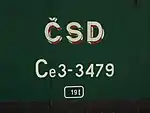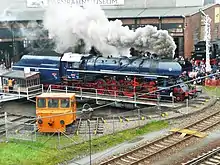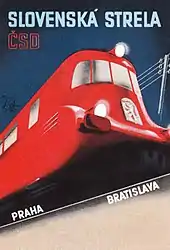Czechoslovak State Railways
Czechoslovak State Railways (Československé státní dráhy in Czech or Československé štátne dráhy[lower-alpha 1] in Slovak, often abbreviated to ČSD) was the state-owned railway company of Czechoslovakia.
 | |
Native name | Československé státní dráhy Československé štátne dráhy |
|---|---|
| Industry | Rail transport |
| Predecessor | Imperial Royal Austrian State Railways |
| Founded | 1918 |
| Defunct | 1992 |
| Successors | České dráhy Railways of Slovak Republic |
| Headquarters | , |


The company was founded in 1918 after the end of the First World War and dissolution of Austria-Hungary. It took over the rolling stock and infrastructure of the Imperial Royal Austrian State Railways.
In 1930 Czechoslovakia had 13,600 km (8,500 mi) of railways: the fifth-largest network in Europe. Of these 81% were state (ČSD)-owned, and the trend was to nationalize the remaining private railways. Most of the infrastructure was concentrated in the industrial regions of the Czech lands. 87% of the railroads were single-track. 135,000 people were employed on the railways: about 1% of the population.
When Nazi Germany dissolved Czechoslovakia in 1939, the Protectorate of Bohemia and Moravia formed the "Bohemian-Moravian Railway" company (in Czech Českomoravské dráhy-ČMD, in German Böhmisch-Mährische Bahn-BMB) under the control of Deutsche Reichsbahn (DR). In the Slovak State the "Slovak Railways" company (in Slovak Slovenské železnice-SŽ) was formed.
In 1945 ČSD was re-established.
After the dissolution of Czechoslovakia at the end of 1992, the company was divided into the state-owned České dráhy (Czech Railways) and Železnice Slovenskej republiky (Railways of the Slovak Republic). The fixed infrastructure was transferred to the successor countries according to location; the remainder was divided by 2:1 ratio.
Electrification
- Electrification of the railways started gradually during the 1920s. In Prague the trains used a direct current system at 1.5 kV.
- To power the line from Prague to Chop (Чоп, Čop, Ukraine State), a direct current system using 3 kV was built after 1945.
- To the north of this line, trains use direct current with voltage 3 kV, to the south they use alternating current with voltage 25 kV at 50 Hz. These two systems continue today.
Notes
- Since about 1990, the Česko-slovenské štátne dráhy (Czecho-Slovak State Railways) variant has actually become more common, after the Velvet Revolution in 1989 and since the beginning of the so-called “Hyphen War” – but until then, the first variant, Československé štátne dráhy (Czechoslovak State Railways), was used mostly